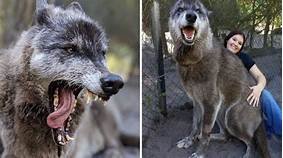Can You Have a Wolf as a Pet? The Facts and the Law
Wolves, with their piercing eyes and powerful presence, have long captivated the human imagination. Their wild and untamed nature often sparks curiosity, leading to the question: can one keep a wolf as a pet? While the idea might seem alluring, the reality is far more complex.

The Legality of Owning a Wolf as a Pet: A Complicated Issue
The legality of owning a wolf as a pet varies significantly across jurisdictions. In some regions, it is strictly prohibited, while in others, special permits or licenses may be available. The complexities stem from the inherent dangers associated with keeping wild animals as pets.
The Dangers of Keeping Wolves as Pets
Wolves, despite their domesticated counterparts, remain wild animals possessing instincts and behaviors that are fundamentally different from domesticated dogs. These instincts can make them unpredictable and dangerous even with the best care.
1. Predatory Instincts: Wolves are apex predators with a natural inclination to hunt. This can lead to attacks on other animals, including those kept as pets or livestock.
2. Destructive Behavior: Wolves are territorial animals and have a strong urge to roam and explore vast areas. Confinement to small spaces can lead to frustration, anxiety, and destructive behaviors.
3. Unexpected Aggression: Wolves, despite socialization efforts, can exhibit sudden and unpredictable bursts of aggression. Even wolves raised from birth in captivity may have unpredictable triggers.
The Ethical Implications: A Matter of Debate
Beyond the dangers, there are ethical considerations surrounding the keeping of wolves as pets. Some argue that it is cruel to deprive these wild animals of their natural environment and social structure.
1. Social Needs: Wolves are highly social creatures that thrive in packs. Isolating them from their natural social setup can lead to loneliness, depression, and behavioral problems.
2. Environmental Needs: Wolves require vast territories to roam and hunt. Confining them to limited spaces can restrict their natural behaviors and cause immense stress.
Wolf Hybrids: A Controversial Alternative
Wolf hybrids, crosses between wolves and dogs, have gained popularity as alternatives to purebred wolves. However, these hybrids can inherit unpredictable traits and behaviors, making them challenging to keep as pets.
1. Behavioral Variability: Wolf hybrids can exhibit a wide range of behaviors, making it difficult to predict their temperament and reactions.
2. Legal Ambiguity: The legality of wolf hybrids also varies across jurisdictions, adding another layer of complexity to their ownership.
Conclusion: A Path of Challenges and Ethical Considerations
The decision to have a wolf or wolf hybrid as a pet should not be taken lightly. It requires thorough research, knowledge, and the ability to provide a safe and appropriate environment. The dangers, ethical implications, and legal complexities make it a path fraught with challenges and ethical considerations.
Ultimately, it is essential to remember that wolves are wild animals and not suited for a domesticated lifestyle. Their place is in the wild, where they can express their natural behaviors and live as they were meant to.
Declaration: All article resources on this website, unless otherwise specified or labeled, are collected from online resources. If the content on this website infringes on the legitimate rights and interests of the original author, you can contact this website to delete it.





